Rex T. Barber facts for kids
Quick facts for kids
Rex T. Barber
|
|
|---|---|

Official military photograph of Rex Barber
|
|
| Born | May 6, 1917 Culver, Oregon |
| Died | July 26, 2001 (aged 84) Terrebonne, Oregon |
| Place of burial |
Redmond Memorial Cemetery
Redmond, Oregon |
| Allegiance | United States of America |
| Service/ |
|
| Years of service | 1941–1961 |
| Rank | |
| Battles/wars | World War II Korean War |
| Awards | |
Colonel Rex T. Barber (May 6, 1917 – July 26, 2001) was a brave World War II fighter pilot from the United States. He is most famous for being part of a top-secret mission in April 1943. This mission aimed to stop a plane carrying a very important Japanese leader, Admiral Isoroku Yamamoto.
Contents
Early Life and Joining the Military
Rex T. Barber was born and grew up in Culver, Oregon. His parents were Charlotte F. Barber and William C. Barber. He went to Linfield College and then Oregon State College in Corvallis. He studied how to make farms work better (agricultural engineering) from 1937 to 1940.
In September 1940, he decided to join the military. He became part of the U.S. Army Air Corps. Later, in October 1947, he married Margaret I. Smith. They had two sons, Rex Jr. and Richard.
Flying for His Country
Rex Barber became a U.S. Army officer and a pilot on October 31, 1941. He joined the 70th Fighter Squadron and arrived at Guadalcanal in the Solomon Islands in December 1942. Flying a Bell P-39 Airacobra plane, he shot down his first Japanese bomber on December 28.
Later, he moved to the 339th Fighter Squadron. Here, he started flying the very fast P-38 Lightning planes. On April 7, he shot down two more Japanese "Zero" fighter planes.
The Yamamoto Mission
On April 18, 1943, Lieutenant Barber played a big part in a mission called Operation Vengeance. This was a secret mission to stop Japanese Admiral Yamamoto. Spies had found out that Yamamoto would be flying in a "Betty" bomber. He was going on a trip to check on Japanese bases.
Many people believe that Rex Barber was the one who shot down Yamamoto's plane. In 1991, the Air Force said that Barber and Captain Thomas George Lanphier, Jr. each got half credit for shooting down the bomber. Barber also helped destroy another "Betty" bomber on the same mission.
In 2003, the state of Oregon said that Barber was the only one who shot down Yamamoto's plane. This was after experts looked at the crash site and saw where the bullets hit. Even with this new information, the U.S. Air Force did not change its 1991 decision. However, a military historian who studied the case later said he believed Rex Barber deserved full credit.
More Combat and Retirement
After his time flying missions ended in June 1943, Captain Barber wanted to go back to fighting. Later that year, he joined the 449th Fighter Squadron in China. He was still flying P-38s. He damaged or probably destroyed three more Japanese planes.
On his 139th mission, he was shot down near Kiukiang on April 29. Chinese civilians rescued him. They helped him with his injuries and guided him to safety five weeks later.
By the end of World War II, Barber was a major. In 1947, he joined the new U.S. Air Force. He even led one of America's first jet fighter squadrons. He retired from the Air Force as a colonel in 1961.
Awards and Honors
Rex Barber received many awards for his bravery and service. One of his highest honors was the Navy Cross.
This award is given for amazing bravery. Here is what the award said about Rex Barber: "First Lieutenant Rex Theodore Barber showed incredible heroism. He was a pilot in a P-38 fighter plane on April 18, 1943. He flew a very long and dangerous mission. He surprised two enemy bombers and six fighter planes. He quickly attacked, destroying one Japanese bomber so close that pieces of the explosion hit his own plane. He also shot down an enemy fighter plane that was trying to stop his attack. His amazing flying skills and strong fighting spirit on this important mission showed the highest traditions of the United States Armed Services."
Barber also received other important awards, including the Silver Star and the Purple Heart.
Life After the Military
After retiring from the military, Rex Barber returned to his hometown of Culver, Oregon. He lived there for 40 years. He worked as an insurance agent. He also served his city as mayor and even as a judge at different times.
He was a big supporter of Little League Baseball and often helped young people in his community. He was involved in many groups that helped others until he passed away at his home in Terrebonne, Oregon. His son, Rex Jr., said that his "afterburner just flamed out on him," meaning he ran out of energy.
Remembering Rex T. Barber
On April 18, 2003, the Governor of Oregon, Ted Kulongoski, declared it "Rex T. Barber Day." The week before, the Oregon State Legislature decided to name a new bridge after him. The bridge on U.S. Highway 97 over the Crooked River is now called the Rex T. Barber Veterans Memorial Bridge.
The new bridge, along with a special plaque and information stand honoring Barber, was officially opened on August 9, 2003. It is located at Peter Skene Ogden State Scenic Viewpoint.
Images for kids
 | Charles R. Drew |
 | Benjamin Banneker |
 | Jane C. Wright |
 | Roger Arliner Young |



